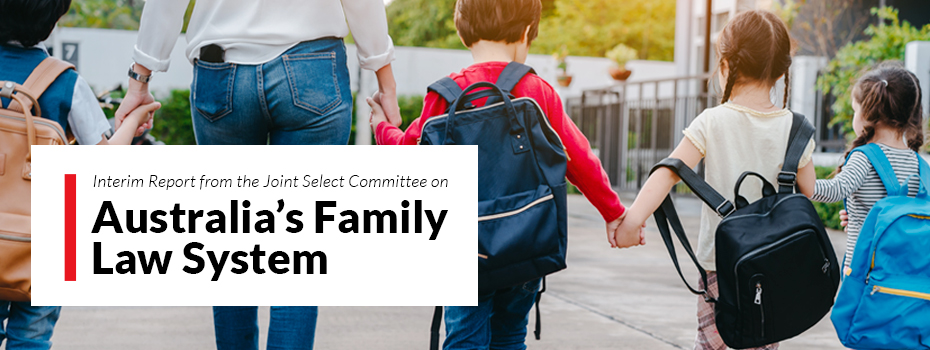Joint Select Committee on Australia’s Family Law System

Interim report of improvements in family law proceedings – an overview
By Richard Chisholm, AM, Honorary Professor, ANU College of Law.
This report itself is 300 pages, and with its seven appendices, extends to over 400. Without making a single recommendation, it makes a substantial contribution to the family law literature.
Background
The Joint Select Committee on Australia's Family Law System, chaired by Hon Kevin Andrews MP, was appointed in September 2019. The terms of reference are (omitting some detail):
The committee was established to inquire into and report on:
(a) ongoing issues and further improvements relating to the interaction and information sharing between the family law system and state and territory child protection systems, and family and domestic violence jurisdictions […];
(b) the appropriateness of family court powers to ensure parties in family law proceedings provide truthful and complete evidence, and the ability of the court to make orders for non-compliance and the efficacy of the enforcement of such orders;
(c) beyond the proposed merger of the Family Court and the Federal Circuit Court any other reform that may be needed to the family law and the current structure of the Family Court and the Federal Circuit Court;
(d) the financial costs to families of family law proceedings, and options to reduce the financial impact […]
(e) the effectiveness of the delivery of family law support services and family dispute resolution processes;
(f) the impacts of family law proceedings on the health, safety and wellbeing of children and families involved in those proceedings;
(g) any issues arising for grandparent carers in family law matters and family law court proceedings;
(h) any further avenues to improve the performance and monitoring of professionals involved in family law proceedings and the resolution of disputes […],;
(i) any improvements to the interaction between the family law system and the child support system;
(j) the potential usage of pre-nuptial agreements and their enforceability to minimise future property disputes; and
(k) any related matters.
The final report was originally due by 7 October 2020 but was extended to February 2021.
We will have to wait until then to know what the committee recommends, because this interim report contains no recommendations and gives no indication of the committee’s likely conclusions. The committee explains:
1.16 In light of the committee's extension to its reporting date, the committee agreed to table an interim report. The report is designed to summarise the wide range of views and issues raised during public consultation. The committee has not yet made recommendations and reproduction of comments from submissions in this report should not be taken as the committee expressing agreement with those views.
The report does indeed contain a summary of the submissions made; and the submissions themselves are available on the committee’s website.This is no small achievement.
One might think that people have become weary of family law inquiries, but there was an extensive response to the committee’s call for submissions. There were 1523 individual submissions (the vast majority being confidential) by 6 October 2020, and 169 submissions from organisations, academics and other professionals.
As well as summarising ‘the wide range of views and issues raised during public consultation’, the report it provides a wonderfully comprehensive review of family law history and developments, and listing of prior reviews and significant documents. Indeed, for reformers, acaddemics, and practitioners, and for anyone interested in understanding current issues in family law, the report is a real treasure trove. The committee deserves credit for this, as do those unnamed support staff who must have laboured mightily behind the scenes to produce this remarkable publication.
The range of topics covered, after the introduction in Chapter 1, is conveniently summarised as follows (at para 1.36):
- Chapter 2 provides a brief overview of the family law system, particularly the courts, and summarises the reforms to the Family Law Act since its introduction and the outcomes of the House Committee's and ALRC's recent inquiries.
- Chapter 3 is a snapshot of the issues raised in the many individual submissions in the inquiry.
- Chapter 4 focuses on the recurring systemic issues in the family law system, including the perceptions of bias within the system; the role of family consultants and expert witnesses; whether the adversarial nature of the family law courts could be improved; misuse of systems and processes; and professional misconduct.
- Chapter 5 looks at legal fees and costs.
- Chapter 6 examines delays in the court system.
- Chapter 7 outlines the issues in relation to family violence and the family law system.
- Chapter 8 explores parenting matters.
- Chapter 9 deals with matters in relation to the division of property following separation.
- Chapter 10 looks at child support and its interaction with the family law system.
- Chapter 11 details the support services within the family law system.
- Chapter 12 explains alternative dispute resolution within the family law system.
The quality of the eventual recommendations from this committee will no doubt be the subject of much discussion and debate. But regardless of that, this interim report makes a significant and valuable contribution, and should assist anyone interested to understand the complex issues involved, and the wide range of views that are held in the community.
 LexisNexis
LexisNexis
